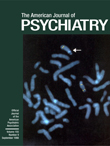Lack of Association Between Neuroleptic Malignant Syndrome and Polymorphisms in the 5-HT1A and 5-HT2A Receptor Genes
Abstract
Objective: The molecular basis of neuroleptic malignant syndrome is unclear, but studies suggest that genetic factors are involved in its pathogenesis. Considering possible involvement of the serotonergic system in neuroleptic malignant syndrome, the authors examined the association between neuroleptic malignant syndrome and polymorphisms of the 5-HT1A and 5-HT2A receptor genes.Method: The authors examined the frequencies of gene polymorphisms in the 5-HT1A (Arg219Leu) and 5-HT2A (Thr25Asn and His452Tyr) receptor genes in 29 patients previously diagnosed with neuroleptic malignant syndrome, 94 neuroleptic-treated patients with schizophrenia who had no history of neuroleptic malignant syndrome, and 94 healthy comparison subjects. Polymerase chain reaction and restriction fragment length polymorphism analyses were used to screen gene mutations.Results: No polymorphic allele was detected in the patients who had experienced the neuroleptic malignant syndrome. Conclusions: The authors cannot conclude that polymorphisms in the 5-HT1A and 5HT2A receptor genes are factors determining susceptibility to the neuroleptic malignant syndrome. Am J Psychiatry 1998; 155: 1275-1277



